President of Russia Vladimir Putin: Good afternoon. And congratulations on this holiday!
Remark: Thank you.
Vladimir Putin: It is also someone’s birthday today?
Sofya Shekhtman: It’s my birthday today.
Vladimir Putin: So, you have a double celebration. I wish you all the very best and congratulations.
Sofya Shekhtman: Thank you very much.
Vladimir Putin: (Addressing director of the Budker Institute of Nuclear Physics Pavel Logachev): Will you please tell us how they are helping you.
Director of the Budker Institute of Nuclear Physics Pavel Logachev: The thing is I also went through this school. I attended it from 1980 to 1982. Then I went to university. And these young people are doing the same thing. They are our future.
Vladimir Putin: They will squeeze you out of your job later on (Laughter).
Pavel Logachev: I will only be too happy to let them. It is my dream.
Sofya Chechetkina: Let me tell you a little bit about our school. Our school is unique from the moment one gets here. That is, first children come to the summer school where the instructors are former students of the Physics and Mathematics School (PMS) or current students of NSU. And, respectively, they are familiar with this PMS atmosphere, and they pass it over to you.
Also, students from very many Russian regions enrol in our school. Our country is huge, and the PMS concentrates on those who are interested in science, who are interested in physics, mathematics, chemistry and biology. Unfortunately, some of them cannot advance to university for their own reasons, however, those who are admitted and stay are very grateful to the school for the knowledge it offers because the teachers at our school are such that they can rarely be seen elsewhere. Apart from working at NSU, being researchers there, they are on the frontline of science and introduce that knowledge to us, they talk to us as equals. This is an informal level, so to say.
Vladimir Putin: You are at the same level.
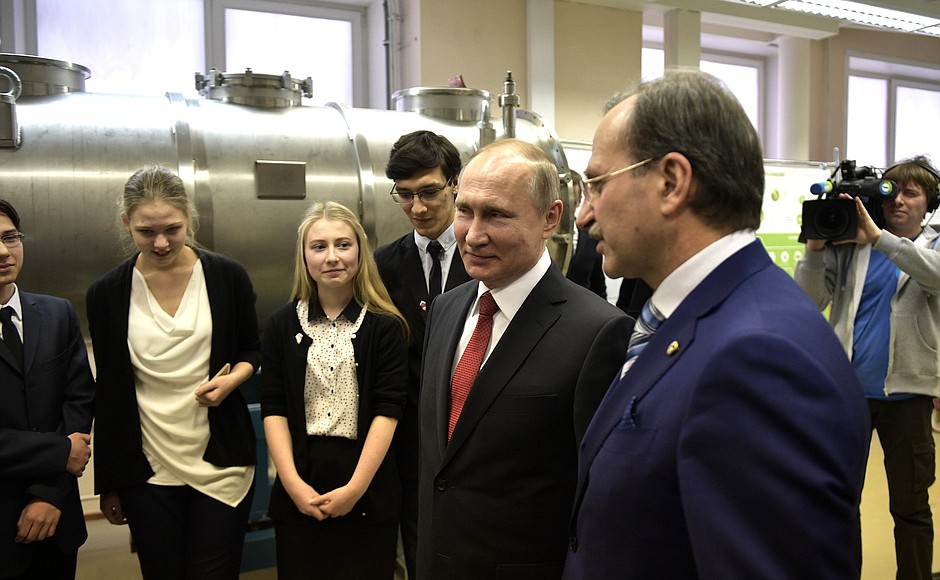
Sofya Chechetkina: Yes, they address us in a formal way, and all those subjects – physics, mathematics, biology and chemistry – are acquired much more profoundly than in other schools. We also have special courses and extracurricular events.
Mikhail Larichkin: We hold such events as special courses after school classes, that is, after lunch or after 3 pm.
Our school of physics and mathematics is quite unique because, apart from physics, mathematics, chemistry and biology, our children can also study just about anything they want. There are over 100 special courses, and the school has a lot of teachers. They joke about the fact that there is one teacher per pupil or even more.
We offer the most diverse special courses, including physics, chemistry and mathematics classes for Olympiad participants, as well as extra-curricular classes on these subjects and the humanities, including the history of Russia.
Vladimir Putin: Do you go to places and take part in Olympiads?
Mikhail Larichkin: Of course. You can see Olympiad scores that will certainly include our students.
Vladimir Putin: Do you focus on physics and chemistry?
Mikhail Larichkin: Physics, chemistry, mathematics and economics because you can get nowhere without these. We have a special course on the history of small firearms; our special courses have a narrow specialisation. We have a political discussion club. Our children study what they want. If necessary, we can organise just about any special course. For example, we had no special course on the Chinese language …
Yekaterina Ivanova: We organised this special course as of early 2018 for two children who want to study Chinese. We can change the school curricula. On our traditional self-governance day, we replace the head master and heads of departments. I headed the physics department. We can submit our proposals, and we can see that something is changing, and that they hear us.
Quite possibly, dialogue between the school administration and us, that is, dialogue between generations, is the most important thing at our school because the older generation passes its knowledge on to us, and not just us. We can see how the school faculty is changing because a lecturer passes on knowledge to a recent university graduate who has also been hired by the school, and he teaches him how to present information correctly. This is really great.
Vladimir Putin: This process of mutual tutorship is quite lively, I gather?
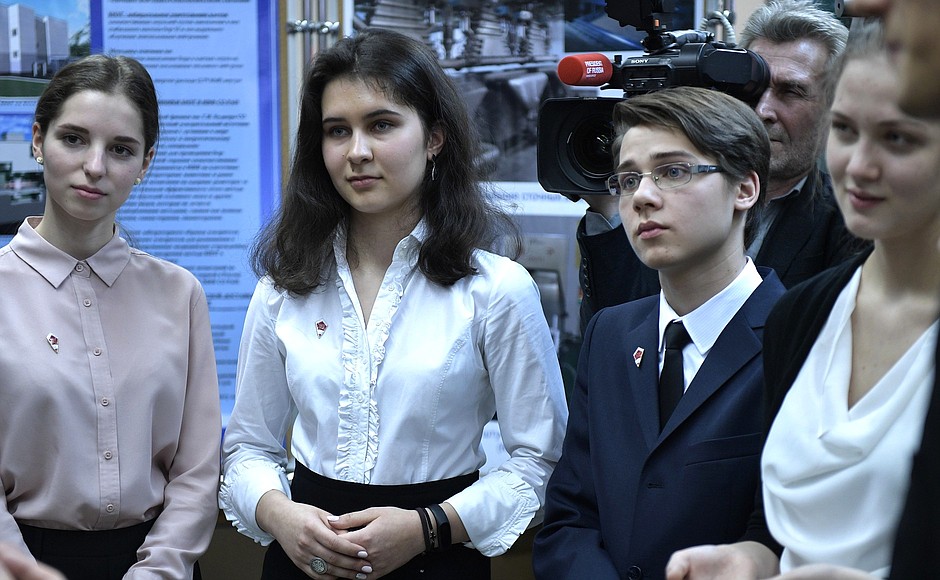
Sofya Shekhtman: Yes. Apart from routine classes, we have extra-curricular studies. Our boarding-school status is a major advantage. We create such an atmosphere and feeling of community when everyone communicates accordingly. And you can discuss some matters that may arise in the evening after classes. People studying with you inspire you all the time because someone knows a certain subject or something else better than you. This is wildly inspiring, and you want to follow in this person’s footsteps. As I see it, this experience is also quite valuable.
Konstantin Tsybikov: Yes. You know, the atmosphere is really important. As a matter of fact, people here are different. Our professors do not only teach, but also take care of us, and they also introduce us into science.
And young people are also completely different. They are interesting and purpose-oriented. We all live together like one big family.
You know, before I began studying here, science was an abstraction of sorts to me, perhaps even a slightly empty word. I did not understand what it really means. But now this is a cause which I want to devote my life to. I want to keep on working. I am really burning inside with this. I know that those same people will help me in the future both in science and in all my start-ups. Therefore, I am very grateful to this place.
Vladimir Putin: There is nothing more interesting and more exciting than creativity, a creative process. So, if you experienced such feelings, this is very important, it is a guarantee of success.
Nikita Okhotnikov: A couple of words about the professors. For example, my physics professor is Pavel Logachev. As a person who is at the forefront of physics, he tells us about everything with so much enthusiasm! Actually, this sparks interest in physics. Being a busy person, he is sometimes absent, and then he sends his substitutes. These are young researchers, who simply come from their institutes to teach at our school. At my previous school, teachers did not explain things the way a scientist from a research institute does, who knows physics so very well.
Vladimir Putin: Of course, they are profound specialists, who have been professionally involved in this for many years. So, there is nothing unusual here. Your previous school is probably a very good one, but the professors there teach basic knowledge, while here you receive deeper knowledge. So, of course, you find it more interesting.
Nikita Okhotnikov: By the way, some of our students are so fond of science that they already work at various institutes. For example, I know guys who go to the Institute of Thermophysics. And my fellows and I, we go to the Institute of Nuclear Physics. In short, we are trying to help in every possible way, while simultaneously trying to conceive our own project that we may be able to realise in the future, while studying at Novosibirsk State University.
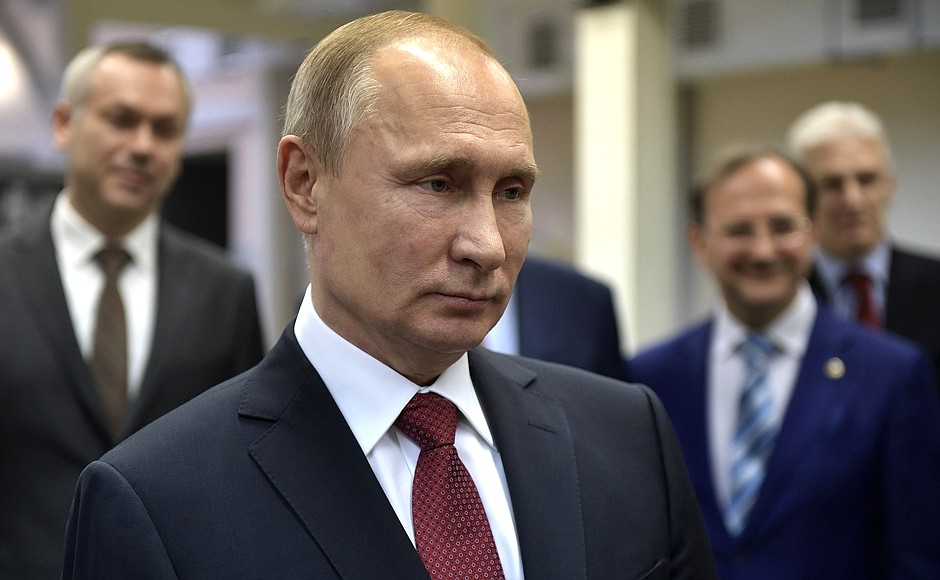
Vladimir Putin: How did you manage to get a place in this school?
Nikita Okhotnikov: In the Physics and Mathematics School?
Vladimir Putin: Yes.
Nikita Okhotnikov: I think many young people got an invitation because they passed the regional stage of a subject Olympiad for school students.
Vladimir Putin: Through Olympiads?
Nikita Okhotnikov: Yes.
Remark: Most of them.
Mikhail Larichkin: There is another way – distant learning school. It is a specially designed scheme offering distant learning of mathematics starting from year 5 and physics from year 7. A person is mailed assignments on the respective subject. Throughout the period of a year the person does five assignments. And he or she is given a mark for the year completed. The results of the distant learning school studies…
Vladimir Putin: May qualify for the invitation.
Mikhail Larichkin: Yes, one can get an invitation. If the results were good, naturally.
Sofya Chechetkina: And also, if someone learns about the PMS, they can come here and pass entrance exams, and following the results they can either enrol or try again the next year.
Polina Turishcheva: It is important to note here that we do not come to the PMS at once. We come to the summer school first.
Vladimir Putin: The summer school?
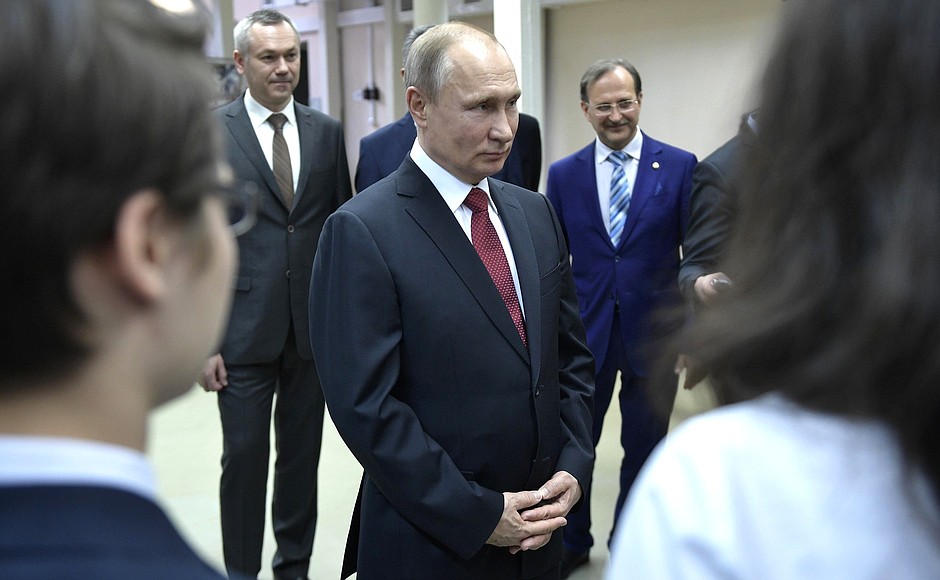
Polina Turishcheva: Yes, the summer school. The schoolchildren who got an invitation come here for a month in August, and there they see how teachable we are, hold exams on the material we were taught in the summer school, and after those exams we enrol in the main school.
In fact, many questions arise from that, and we would like to ask them. Because in reality science is creativity, you were saying, and it is very important to find your guide, your teacher in creating. Many children want to take up science while others want careers in engineering. We know what is going on in science here but we have no idea about what is happening in Moscow, St Petersburg, and other places, such as Sarov. This is an information issue, because most of us got an invitation without knowing anything about the school. And we would like to have access to more current information. It would be very important in this respect.
And the second question. Most of us will graduate soon, and many want to apply to universities. Here is the question: If your child was interested in science or engineering, where would you send him?
Vladimir Putin: Where the child wants to go.
Polina Turishcheva: But he or she would ask for your advice anyway?
Vladimir Putin: You know, it is hard to give this kind of advice. I will try and formulate my main advice – you should do what you are eager to do most. Why? Because when a person likes doing something, they achieve the best results.
Yekaterina Ivanova: Thank you.
Nikolai Davydov: I would rather ask this question. As a person, who will graduate soon and who wants to dedicate his life to science, I am concerned about a little problem related to the fact that some intelligent people, even around me, are starting to think about leaving the country. It makes me a little sad because the guys are really very smart, they are potentially future scientists.
Vladimir Putin: If they are smart, let them stay.
Nikolai Davydov: But you know, they must be enticed. I for one am interested…
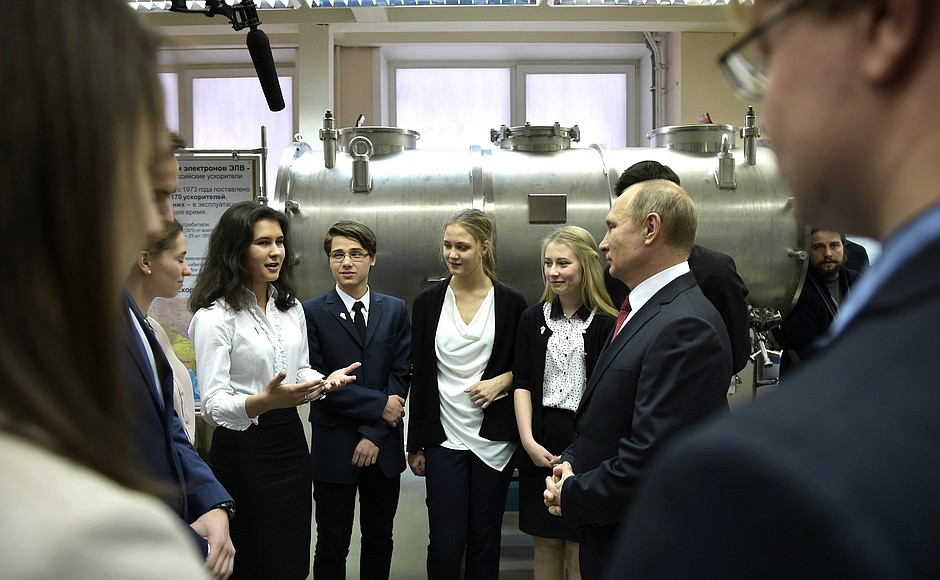
Vladimir Putin: I see what you are trying to get at. And of course, we keep on thinking about it all the time. We want talented promising specialists to stay in the country. But we are not going to keep them chained up.
Nikolai Davydov: That is clear.
Vladimir Putin: It is impossible and it is wrong. A person in today’s world has a right to choose the place and occupation to his or her liking. On our part, we have increased the funding of science by 3.7 times in the past 15 years. These are huge numbers. And if we take today’s prices, it amounts to dozens of percent. But that is not the point, the point is not in that percentage, the point is what we are trying to create and, as I feel, we are achieving this, which your stories also testify to. This is also a result of working – supporting such educational institutions as yours. They are being set up not only here but also in other regions of the country, and research opportunities are also created, such as mega grants.
The head of the institute has just spoken about how the results of mega grants enter practical application in specific work. We have just seen the installation. This is why we will keep creating such conditions, we are interested in this.
The mega grants I spoke about were given both to our researchers and to foreigners, approximately fifty-fifty. We are also attracting foreigners, and they keep coming. They make up a little bit more than a half of the mega grant holders. They arrive and spend half a year here. Some of our former compatriots are returning. So, you talk to them about why they are coming back. There are several reasons.
First, it is very important to live in the environment of your native culture and language. It is an extremely important matter. Wherever you are and whatever you are do, you will feel alien abroad for a very long time or forever. This is number one.
Second, in art and science it is crucial to achieve results on a planet-wide scale, and it belongs to the entire humankind.
But it is even better when it belongs not only to the humankind but also to the land and the people where we come from. And this connection is extremely important. And at certain periods in one’s life it yields the same satisfaction as the results of creative work.
This is the reason why you should take those decisions yourselves. And we, in our party, will be creating conditions to ensure good work for you here.
Nikolai Davydov: I would be happy if there is some movement between our country and abroad. I think this could be most beneficial.
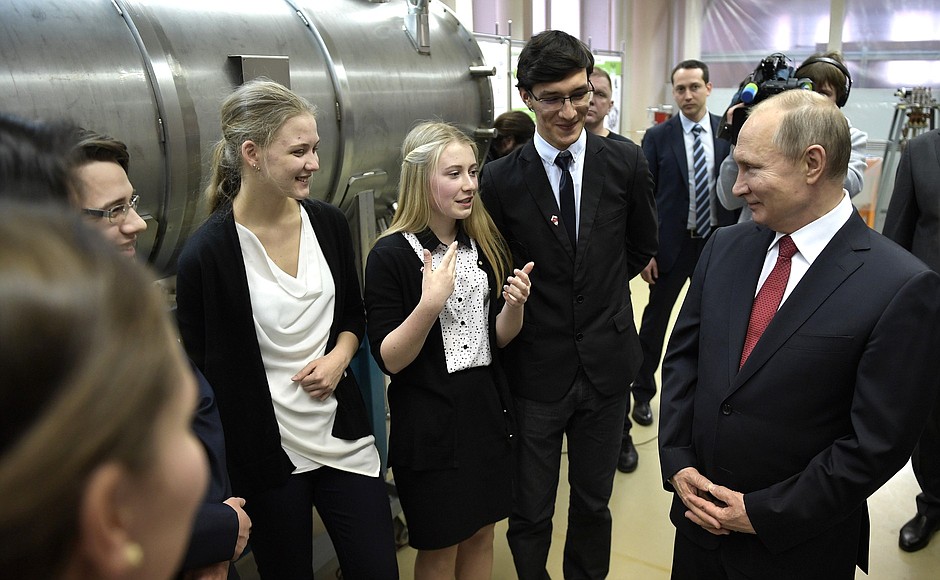
Vladimir Putin: Russian science, apparently, can and will be a part of the world civilisation and international science regardless of all the current complexities. But you, probably – no, not probably but certainly – read the assessments of international experts regarding what is happening in Russian science, so I do not have anything to add. And the assessments are positive.
I wish you every success and all the very best on the occasion of Science Day.
Nikolai Davydov: Thank you.
Vladimir Putin: Have you been to Sirius, has anyone been there?
Nikolai Davydov: Several people.
Vladimir Putin: Did you like it there?
Nikolai Davydov: There are, let’s put it this way, some everyday problems, which were for me a little…
Vladimir Putin: Have you been there?
Nikolai Davydov: Yes, two years ago when I was in the ninth form. It is generally pleasant and comfortable to live there, but you know, they seldom let you leave the premises. It is clear that we must be accompanied by a counsellor or guide, I don’t know what the proper name is for them, but sometimes it appears too little, we went out only twice during the month. For example, for me, this territory is not enough. But this is a trifle.
Vladimir Putin: We will take note of this, I will speak with the centre’s management. And how was the overall organisation there? I am just interested in your evaluation in terms of the overall process of organisation.
Polina Turishcheva: Can I say a little bit about the organisation?
The thing is I was there when the centre was just being opened. And I liked the idea, because Sirius has a unique funding capability, and they have personnel that can ensure everything is well organised, But the problem is that children arrive, carry out their projects and then leave. It might mean some progress for the project but not for the child. And it would have been interesting if the Sirius’ capabilities transformed into some existing school projects. Because schools are often underfunded or lack capabilities whereas Sirius could turn into an off-site venue where children could come, conduct their experiments using good and high-quality equipment, then go back to their schools to continue their work. And I think it would be much more effective from the point of view of the organisation.
Vladimir Putin: Yes, you are right, because it would offer additional opportunities for the children, and Sirius would function at a higher level because it would guide a particular person and support the respective projects. I shall bring this up with the management.
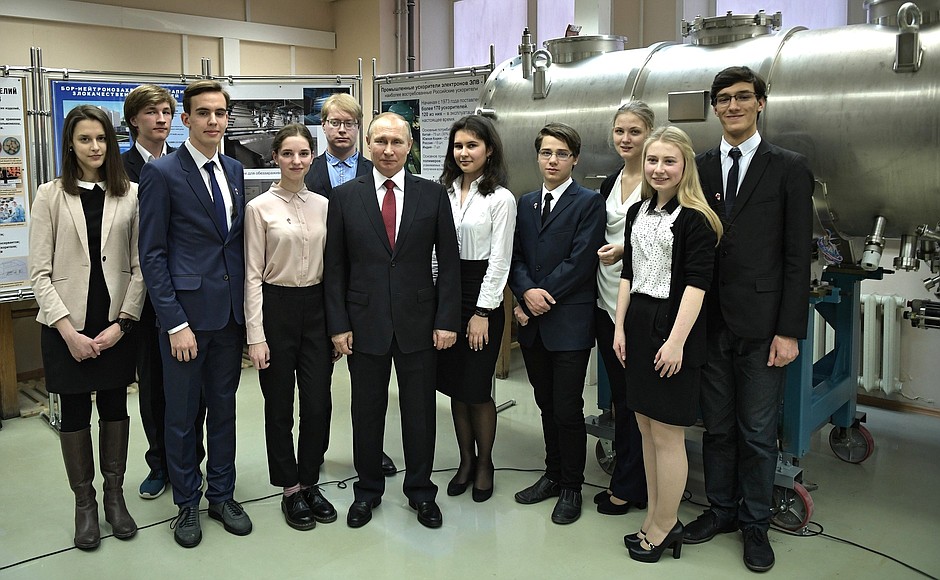
Konstantin Tsybikov: There is another issue that is important to us, since we are future graduates: the National Final School Exam.
Back when it was introduced it played an important part in consolidating students from different parts of the country, and it still continues to fulfil this role. But the problem is that to be able to pass the exam, you have to store a lot of information, to learn and memorise a lot.
Vladimir Putin: Strange, isn't it? (Laughter.)
Konstantin Tsybikov: The problem is that information is constantly updated so it could well be the case that in around five years, when we graduate, all the things we have learned will no longer be relevant. On the other hand, this test does not even show the student’s aptitude for one subject or another. In short, I can study to take the exam in history, I can learn a lot but it will not show if I have an aptitude for this subject, the potential to become a historian. It just shows that I have a good memory. Meanwhile, various conferences in which students take part or research papers they write count for almost nothing when applying to a university.
Vladimir Putin: In your opinion, does anyone need Ancient Greek of Latin?
Konstantin Tsybikov: Doctors.
Vladimir Putin: Relatively. What am I driving at? The point is that, at first sight, it may seem that some knowledge or other is completely unnecessary and cannot be applied in practice. Nevertheless, this knowledge is relevant because it contributes to the person’s development, it shapes an entirely different personality, creates a broad vision of the diversity of the world in which we live. This is extremely important. I mean both humanities and science.
So, it is not always correct to say that we have learned something but we will not need it in the future, even if this knowledge is not stored in our active memory. Because in any case it helps us pass through certain development stages. It will certainly do us no harm. On the contrary, this will only do us good.
But in any system, including the National Final School Exam, which you mentioned, in absolutely any system there are things that require improvement or changes. As a matter of fact, life is constantly changing. You know, lawyers say: a law becomes outdated the moment it is adopted. Because life has already moved forward, and if the law regulates relations between people, these relations are changing, while the law was written yesterday. It is the same in this sphere. Therefore, we must think how to improve this system.
For example, at Moscow State University, I do not know if this exists at St Petersburg University, but it definitely exists at MSU, and you probably know it too: applicants are judged not only by their National Final School Exam results but they also undergo a whole range of tests, interviews and so on. These are conventional interviews. Because nothing is, cannot be and must not be static. Bearing in mind that you approach this critically – your tutors listen to you and hear you – we will be gradually changing this in the right direction.
I would like to wish you again all the best, every success, good luck, and again, my congratulations to you on your special day.